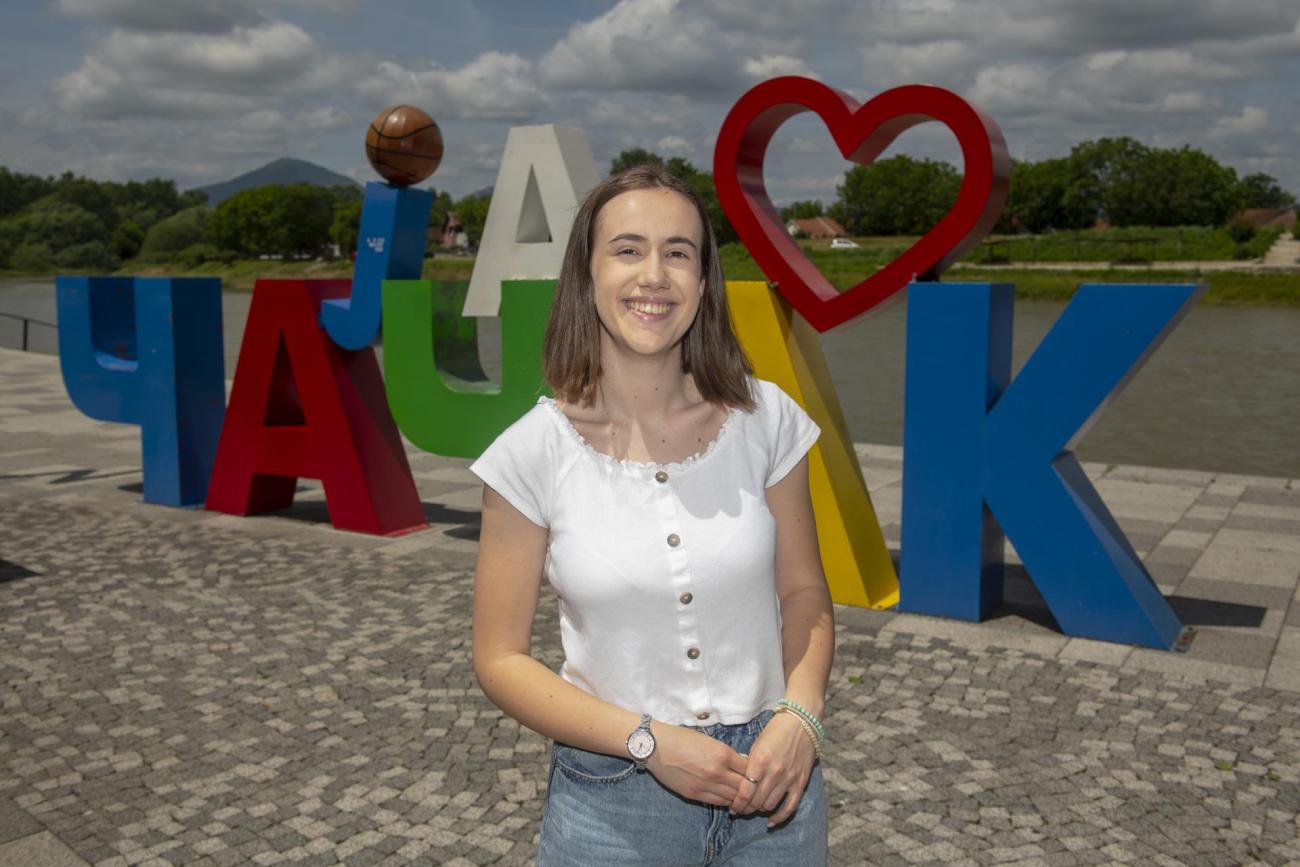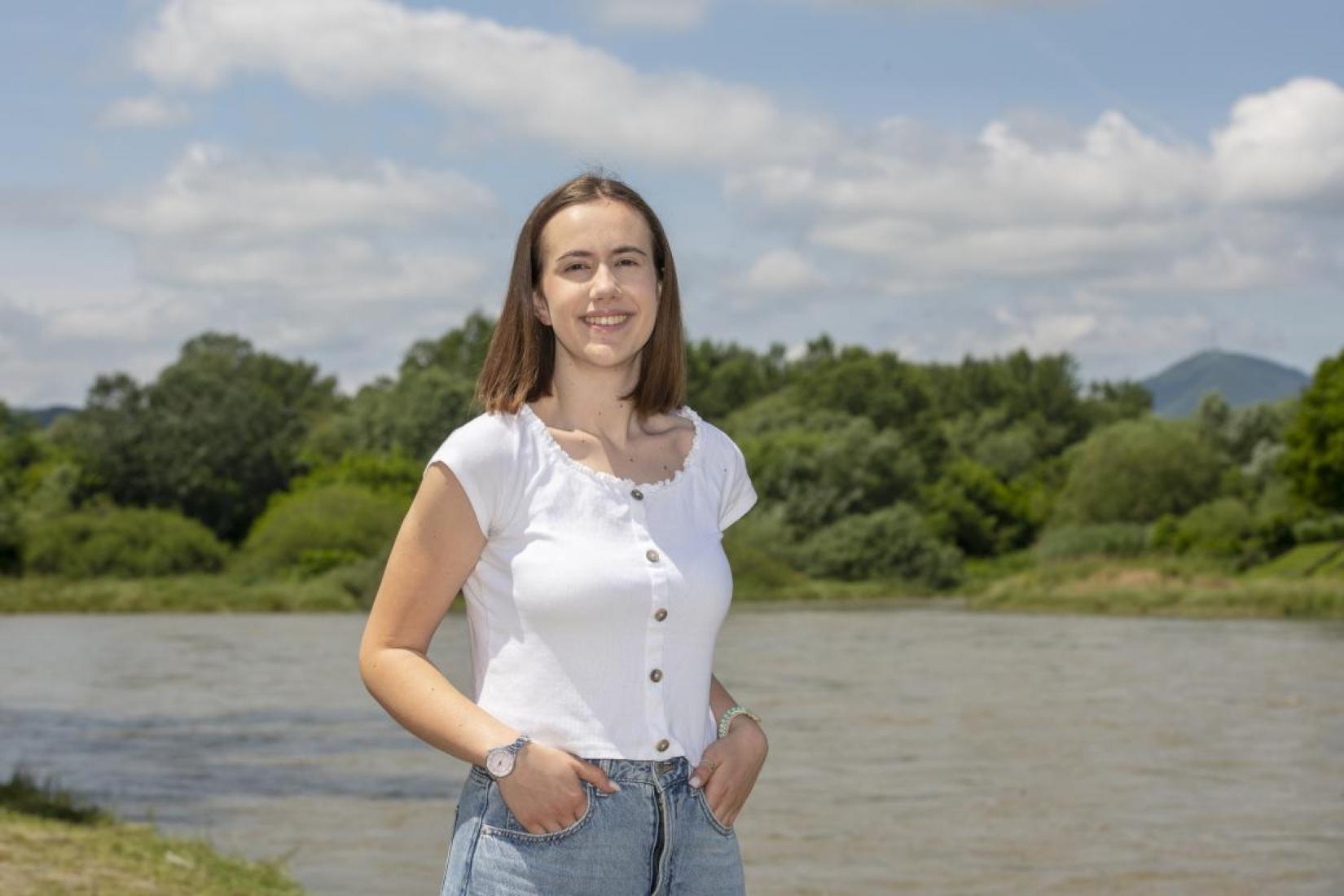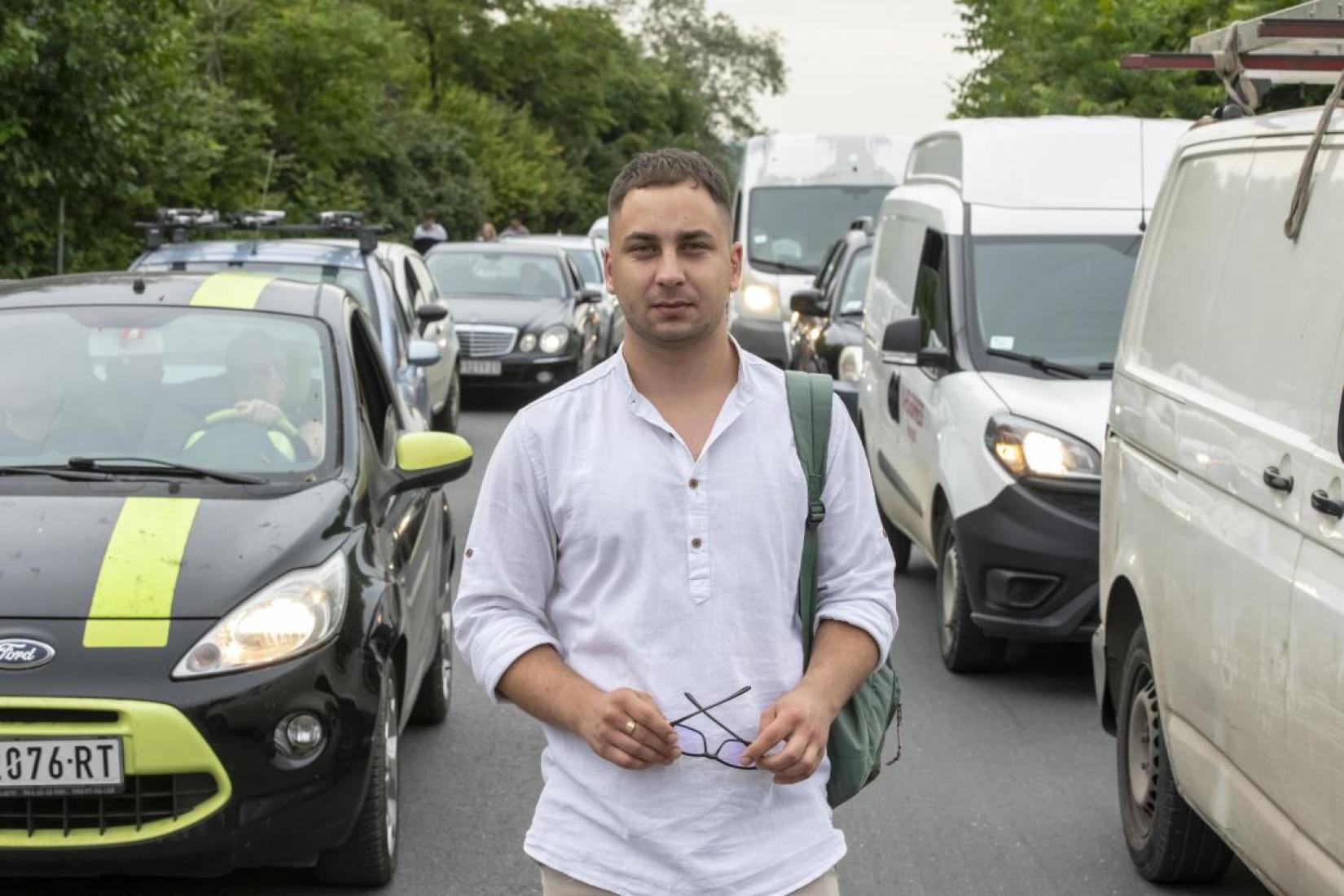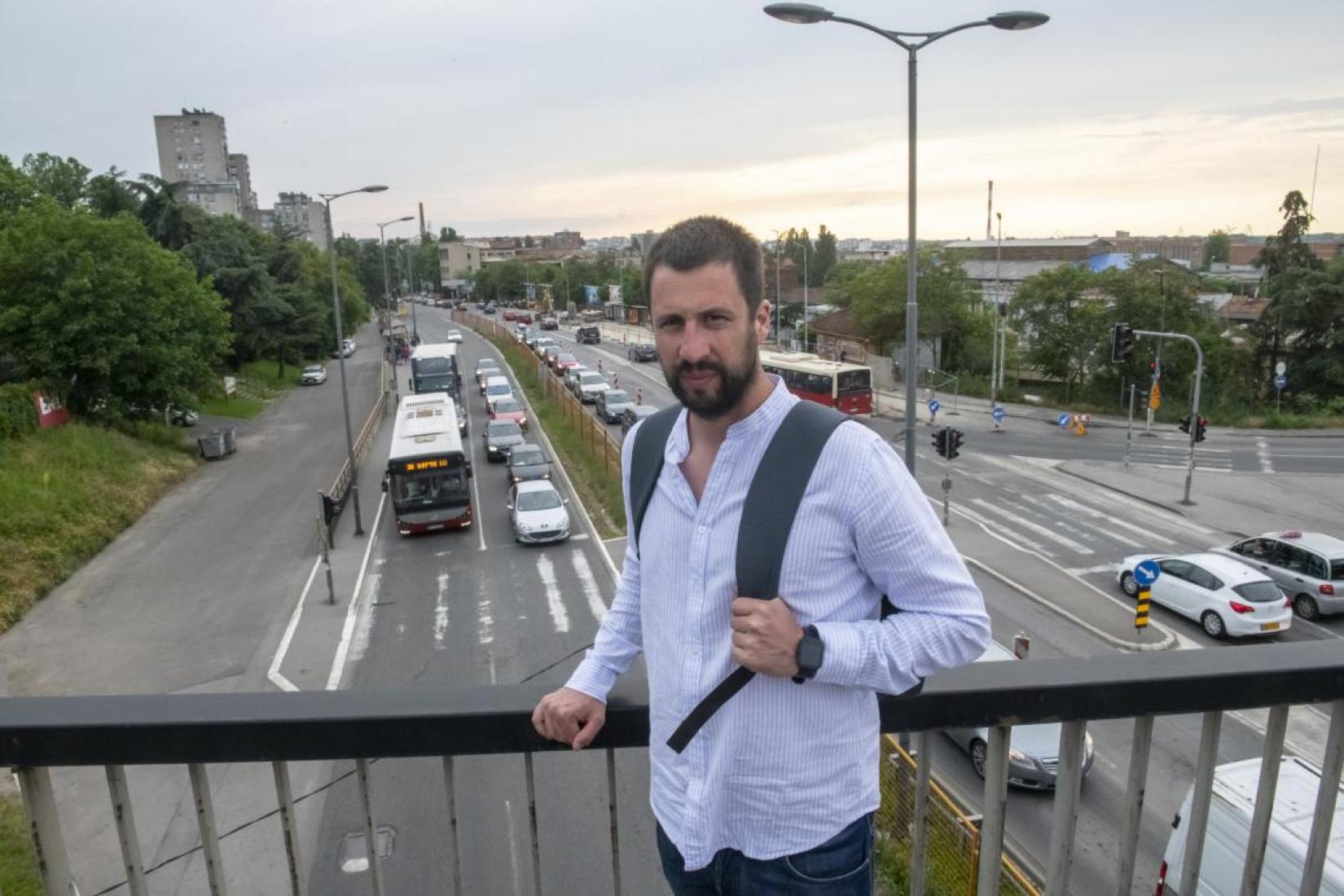Clean Air: Empowering Young People to Drive Change

The innovative Schools for Better Air Quality project was launched with the goal is to raise the awareness about air quality and its impact on people’s health.
Serbia, Belgrade/Cacak, June 2023 – Elena Perunicic, a bright and cheerful high school student about to start university, became interested in the mental health of young people and began volunteering at the age of 16. She credits UNICEF for opening the door for her. She has many interests, but Elena explains that the topic of air quality naturally captured her attention.
“I became interested in the topic of air pollution when I started seeing smog in Cacak. It reached its peak when I managed to take a photo of it with my camera,” Elena explains.
Although the problem of air pollution may seem obvious, it wasn't fully understandable to Elena, just like it isn't to most of her peers.
“I didn’t know what my impact on pollution was or what causes pollution. School systems and programmes are not providing support in this regard. The topics of sustainable development and environmental protection are neglected.”

Janko Jacovic, a postgraduate student, has been passionate about environmental protection since high school.
“My interests began in high school when I decided to study Ecology at the Faculty of Biology. The topic of air quality and environmental protection particularly inspired me, especially during my studies when we delved deeper into the problem itself,” recalls Janko.
Elena and Janko have become ambassadors for Youth4Air, joining a group of 40 young people from 20 cities and municipalities in Serbia who share a common interest in understanding the causes and consequences of pollution and striving for cleaner air. Their primary objective is to actively contribute to positive change. UNICEF, along with the Government of Norway and other partners, have provided invaluable support in their pursuit.
“Connecting, together with UNICEF and its partners, has managed to inspire young people to apply for the project. Then, we took 40 young people from 20 different cities out of urban environments into a camp. Then they returned and became leaders and peer educators. With the help of mentors, they managed to create the first, famous, Declaration on Clean Air in Serbia,” explains Deniz Hoti, Founder of the youth organization Connecting.
Nearly a thousand young people in Serbia came together to create the First Youth Declaration on Clean Air, voicing their views on the challenges posed by pollution. Prior to this, their peers played a crucial role in providing them with the necessary information on this subject. Furthermore, through UNICEF's online platform U-Report, an astounding ten thousand young people demonstrated their readiness to shoulder the responsibility and take action.

“To write the Declaration, we organized so many workshops!” Janko says proudly. “To get a couple of letters on paper that are now so precious. The Declaration was made as a result of the work of young people, Youth4Air ambassadors, 40 of us, who organized workshops all over Serbia and collected information, opinions of our peers. We had the opportunity to educate our peers and collect their opinions and integrate all that into a document called the Youth4Air Declaration.”
Janko’s biggest impression is the strong desire of young people to actively participate in the decision-making process regarding air quality. This involvement becomes attainable when they are equipped with accurate and comprehensive information from experts in the field.
The key, Deniz Hoti believes, is participation. Young people have become aware of how they can get involved in decision-making processes.
“We translated it to simple terms, what it means to be an active young person, how they can get involved in all those boring things that they are prejudiced against. The key were the skills they acquired on how to communicate with decision-makers, how to write a public policy proposal and that they shouldn't be afraid of doing it, and how to advocate for their rights and the rights of their peers. We provided them with the space to gain creative confidence, to get the opportunity, to be the leaders and representatives of the young people!”
Elena and Janko continued their discussions about the Declaration with their peers, recognizing the importance of spreading awareness. Elena took an active role in organizing additional workshops, aiming to inform as many friends as possible about the opportunity for them to contribute to the solution for clean air.
“After the project ended, my friend and I organized three workshops aiming to collect data from our peers on the topic of air pollution. I was sceptical about how interesting the topic would really be to my friends - but it was. This is something they’re interested in, they’re just afraid of looking silly because they can’t find the data. They left the workshop with a positive experience and became interested in programmes that can improve their knowledge and skills in this field,” says Elena.
Young people are now aware of the kind of air they breathe, says Deniz Hoti.
“The best method for that was to educate as many of our peers as possible, so that future generations can make decisions more consciously, wherever they are in the future, in business or in institutions, everyone will work somewhere. For them to make smarter decisions, it’s very important to inform them on time about what is and what isn’t good. They said: we are a resource, count on us, we can help all of you from the institutions. If you don't have enough resources to send that message to our peers, we’ll do it for you.”

Youth4Air ambassadors with their peers in Serbia are expanding the network of those who are aware and responsible for environmental protection.
“What’s interesting is that I first became active at the national level, through cooperation with UNICEF and by volunteering in their projects. Then I learned about volunteering mechanisms at the local level. In the meantime, I also became a member of the Youth Office. Volunteering and activism are a great way to connect with many people and learn a lot. To have a platform and support to actually do something. We really want our voice to be heard and to contribute to solving the problem,” explains Elena.
The innovative Schools for Better Air Quality project was launched by UNICEF and the Government of Norway. The goal is to raise the awareness of school-aged children and young people, their parents and teachers in 15 local self-government units in the Drina and Zapadna Morava river basins about air quality and its impact on people’s health and well-being, as well as to stimulate the creation of a favourable environment in at least 3 municipalities that will lead to changes in local policies, budgets and environmental protection programmes, including the protection of air quality, with the participation of young people and prioritizing the best interests of children.
Raising awareness and acquiring knowledge on air pollution and the consequences of the pollution on the environment is stimulated through activities that promote the importance of air quality monitoring, education in natural science subjects, the so-called STEM subjects (biology, chemistry, geography, physics, mathematics, IT and computer science, engineering and technology), strengthening the capacities of local self-government units to include young people in the decision-making for improving air quality and the environment, informal education of young people on the topic of air quality and encouraging youth climate activism in Serbia.
The project is implemented by UNICEF with the financial support of the Government of Norway, with the support of the Ministry of Education and the Ministry of Tourism and Youth, and in partnership with the Institute of Nuclear Sciences Vinca, the Standing Conference of Towns and Municipalities (SCTM), the Digital Serbia Initiative (DSI), the Internet Society of Serbia, the Petlja Foundation, the Centre for the Promotion of Science (CPN) and the organizations Connecting and Junior Achievement Serbia, and in cooperation with local communities.




